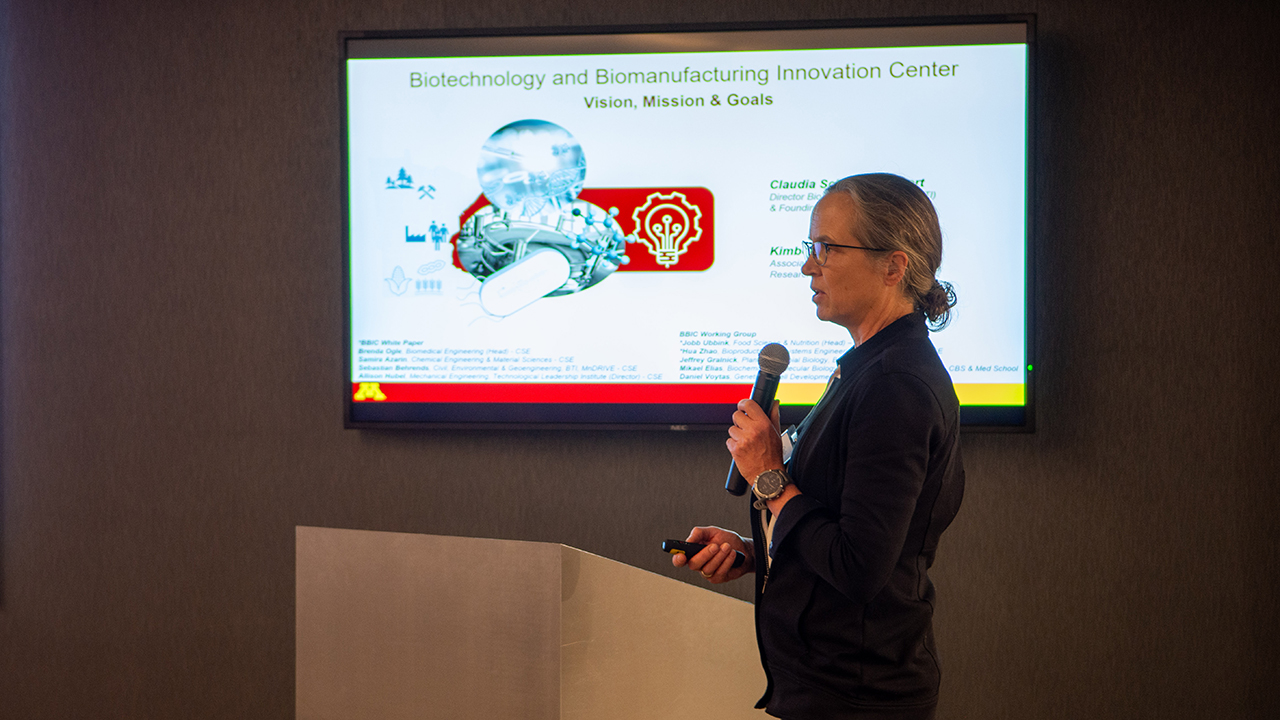
BBIC Founding Director Claudia Schmidt-Dannert at kickoff event.
On December 11, 2023, Vice President for Research and Innovation Shashank Priya led a kickoff event launching the Biotechnology and Biomanufacturing Innovation Center (BBIC). He was joined by Interim UMN President Jeff Ettinger, BBIC Founding Director Claudia Schmidt-Dannert, Peter Frosch of Greater MSP, and many interested faculty and private sector partners.
“This center for biotechnology and biomanufacturing is both a recognition of what our strengths are at the University and a signal of our future ambitions,” said Ettinger at the kickoff event. “We want to build a research infrastructure that’s relevant to Minnesota, and even more than that, we want to be part of the foundation for a new bioinnovation ecosystem here.”
BBIC seeks to build a biomanufacturing ecosystem in Minnesota that fosters cross-disciplinary research, innovation, entrepreneurship, education, training, outreach, engagement, and partnership—an ecosystem that is well aligned with the planned future federal investments (e.g., the National Biotechnology and Biomanufacturing Initiative).
“We’ve already released our first call for seed funding proposals, which will provide $600,000 to six projects and is expected to provide follow-up funding that will eventually lead to commercialization,” said Schmidt-Dannert. “We believe this initial seed funding will strengthen UMN faculty’s competitiveness for external grant opportunities in these areas.”
BBIC aims to: build on the strengths of the University, such as biocatalysis, synthetic biology, microbial engineering, bioremediation, biomaterials, polymers, plant proteins, and biologics/therapeutics; take advantage of Minnesota’s abundant natural resources (agricultural lands, forests, minerals, water, workforce); connect with Minnesota’s well-developed agricultural, biomedical, and food ecosystems; and build climate-change resilience.
“Biomanufacturing technologies are very much priorities for the State of Minnesota, our national industries, and current and future federal efforts,” said Priya. “It’s important for our team that these technologies address larger complex questions such as how we’ll feed 10 billion people, how we’ll mitigate the effects of climate change, and even how we’ll deal with the next pandemic. BBIC will provide the pathway for creative ideas to evolve, and it will allow the scalability and repeatability needed to transition them to industry partners.”
BBIC represents one of the 14 high impact research themes identified by the Research 2030 workshop held last spring. RIO is currently working on a second initiative called Sustainable Futures. This program will build on the UMN strength in geospatial information science to develop mapping capabilities for visualizing Sustainable Development Goals at the county level and using that data to assist the government in developing informed policies.